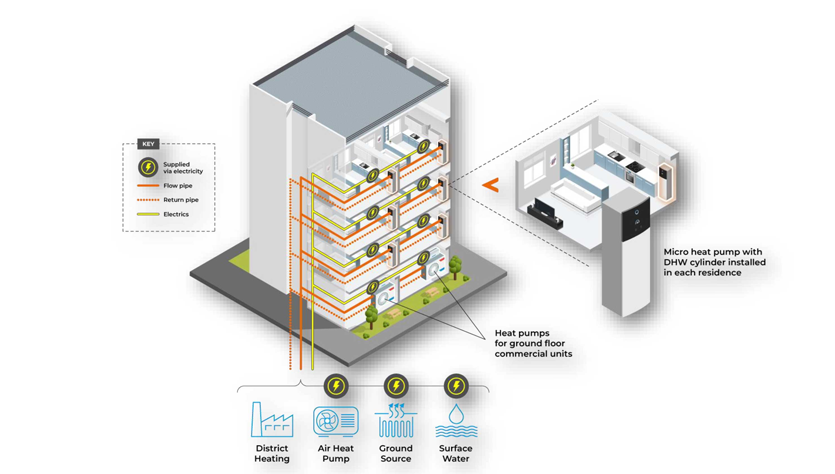
Large-scale applications of heat pumps are relatively new to the UK and we have successfully installed the UK’s largest water source heat pump at Queens Quay, Clydebank, which will see two 2.65MW heat pumps extract energy from the River Clyde, to provide heat and hot water to surrounding homes and businesses. We are also delivering a retrofit heat pump project in Southwark where heat will be extracted from water using ‘open loop’ supplied Water Source Heat Pumps and when completed, the technology will become the primary heat source for the heat, supplying low carbon heating to 2,175 homes. in the Consort, Newington and Wyndham housing estates.
Heat pump heating systems take the ambient heat from a source, such as the ground, water or air, and then boost it to provide low-temperature heating and hot water. Importantly, each of these types of heat pump systems has the ability to provide cooling as well, making them useful for the warmer summer months when the heating would normally go to waste.
Unlike traditional heating methods, which often rely on carbon-intense fossil fuels, heat pumps are powered by electricity which can come from renewables, or directly from the national grid. This, combined with high coefficients of performance makes them an attractive choice for anyone looking to find a financially viable way to decarbonise. For information on selecting a Heat Pump hear from our experts on the 5 key considerations.
Heat pumps rely on electricity; their environmental credentials are often tied to the national grid, but as this decarbonises, heat pumps provide greater carbon reductions and are now regularly considered as a potential solution for projects of all sizes. With access to growing resources of renewable electricity, electrification of the UK’s heating infrastructure is a core strategic ambition and heat pumps are perfectly aligned with planned updates to legislation.
This optimism for the technology is shared by the UK government, with The Energy Secretary describing water source heat pumps as "game changing" and the government setting a target for 4.5million domestic heat pumps across the UK in addition to commercial and industrial installations.

5th generation district heating has steered the possibility of schemes which can operate at ultra-low temperatures (as low as 20°C/10°C flow and return), making a new type of heat pump technology viable.
Ambient Loop schemes are a next generation technology which has the potential to transform the way we generate and use heat whilst delivering large carbon savings and meeting the government’s ambition of electrifying heat generation. The system works by generating hot water from a central heat source, such as an air, ground or water source heat pump. This water is circulated in a closed loop system and customers extract heat from this loop and then boost it via individual heat pumps within their properties to create heating and hot water.
As legislation and planning requirements become increasingly stringent, especially with regards to carbon emissions, it is predicted ambient loop systems will play a large part in the future of the UK’s heat generation mix.